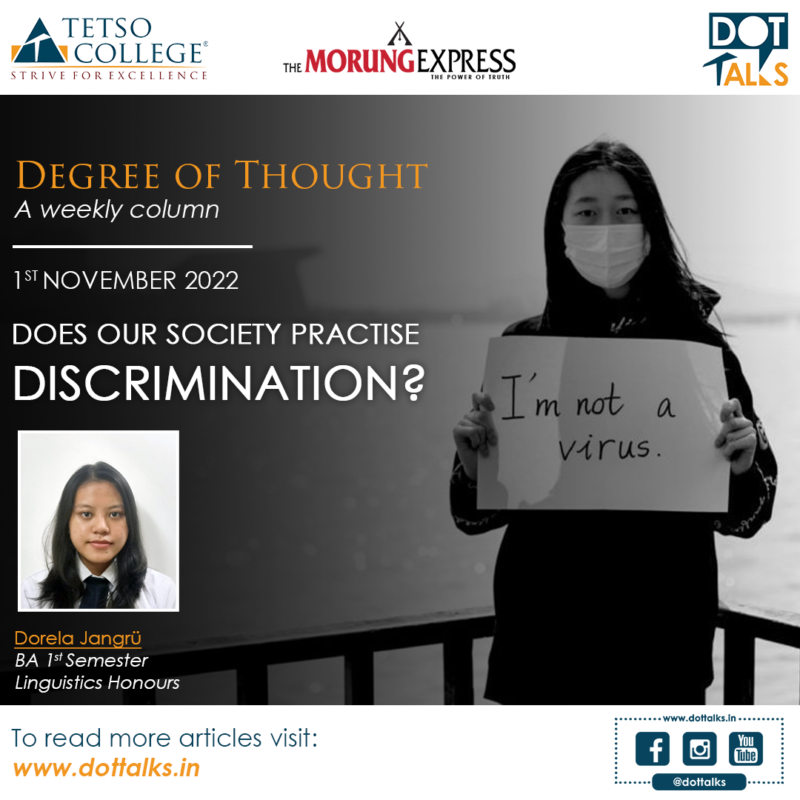 According to the Oxford Dictionary, discrimination is “the practice of treating somebody or a particular group in society less fairly than others”. Discrimination has taken various forms and shapes across different stages in human history and today’s modern society is no exception. In this article, I explore the less talked about discrimination that exists in our own society.
According to the Oxford Dictionary, discrimination is “the practice of treating somebody or a particular group in society less fairly than others”. Discrimination has taken various forms and shapes across different stages in human history and today’s modern society is no exception. In this article, I explore the less talked about discrimination that exists in our own society.
Does Our Society Practise Discrimination?
As a society, we always hear of the discrimination faced by the North-Eastern people in the mainland regions of India because our appearance, our food, our culture, etc. We hear of how some don’t even consider us as Indians and often insult us with racial slurs. Over the years, with more understanding and acception of diversity in our country, the occurences of discrimination have reduced but are not totally eliminated yet. But, I believe, what we as a society fail to recognise is that discrimination does not necessarily occur only against us, but that we may also practise it in our own society. Don’t get me wrong, I’m all for speaking out against discrimination, but when we do so, we tend to forget about the prejudice that people of other ethnicities also endure in our society.
Growing up, I saw discrimination, frequently directed towards children of other ethnicities, mainly because of the colour of their skin, their accent, and so on, excluding them from their groups, even in classrooms and schools. And I have also witnessed young people start fights with non-locals on the streets for the silliest of issues. If discrimination begins in the place where children are supposed to learn about equality and impartiality, what does that tell us about our education system? And more importantly, what does that tell us about our society? As adults, as parents, could it be that we consciously or unconsciously pass on our beliefs, principles, and attitudes to our children? Perhaps that’s how discrimination still continues today.
We talked about all the opportunities for small businesses and enterprises being snatched away. But do we encourage or support ourselves enough to work in the line of work that the so-called non-locals are doing? It is important that we encourage ourselves to pursue employment in all areas, but at the same time, understand that maybe they are doing hard labor that we do not necessarily choose to do. And instead of accusing them of stealing work opportunities, we should learn the values of hard work and perseverance from them and encourage our youth to do the same.
Some people would even argue that the degree of discrimination faced by our society is nothing compared to what we face in mainland India and that, compared to how they treat us out there, we treat non-locals in our state reasonably well. But discrimination is discrimination, no matter the degree or extent, and two wrongs do not make a right. And every kind of prejudice, whatever of its form, results from superiority complex, ignorance and disregard for the people’s identities.
There is no doubt that discrimination exists in every part of the country, and the fight against discrimination is a long and hard one, but it is not impossible. It simply starts with us—with you and me. So let us first fix the issue of discrimination within our society, and then we can strongly stand against the discrimination we face outside. As Mahatma Gandhi once said, “You must be the change you wish to see in the world.” To fight this social evil, we have to first and foremost educate ourselves and the people around us, especially the younger generation, about the values of equality and inclusivity; that we are all born equal; and that we must embrace all people irrespective of our differences and treat them fairly and equally. Our diversity is what makes our country so beautiful, and embracing it is the key to peaceful coexistence.
Degree of Thought is a weekly community column initiated by Tetso College in partnership with The Morung Express. Degree of Thought will delve into the social, cultural, political and educational issues around us. The views expressed here do not reflect the opinion of the institution. Tetso College is a NAAC Accredited UGC recognised Commerce and Arts College. Currently, the Degree of Thought Column is managed by the Department of Mass Communication, and the editorial team are Dr. Jenny Lalmuanpuii, Asst. Professor; K.C. Gabriela, Asst. Professor; and Rinsit Sareo, Asst. Manager, IT, Media & Communications.
For feedback or comments please email: dot@tetsocollege.org

